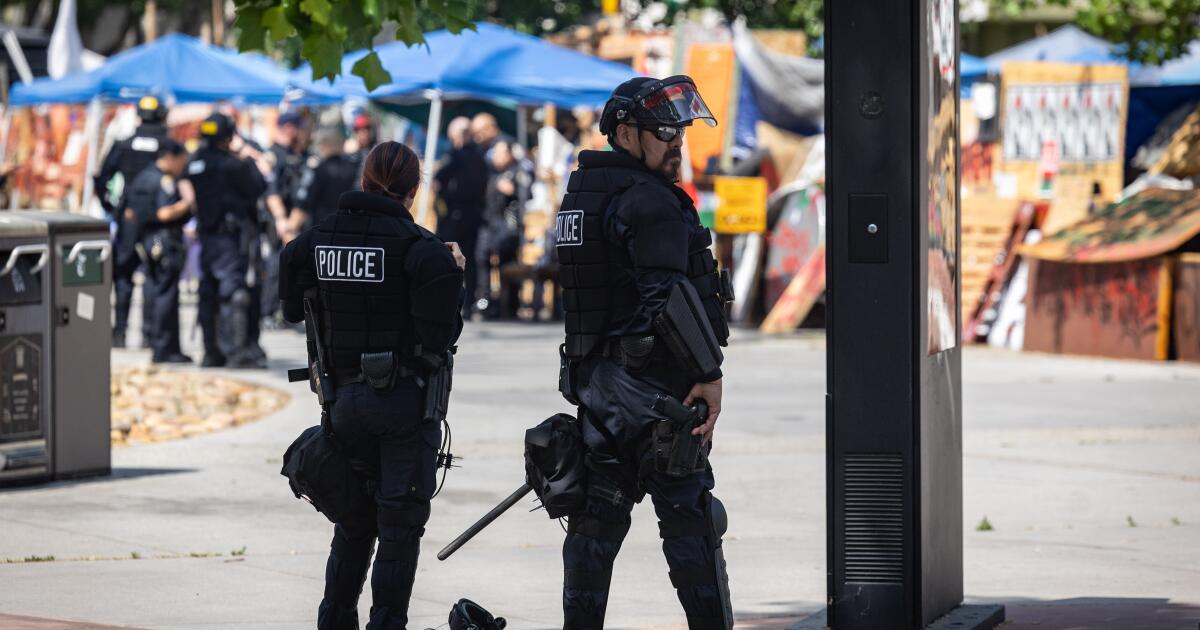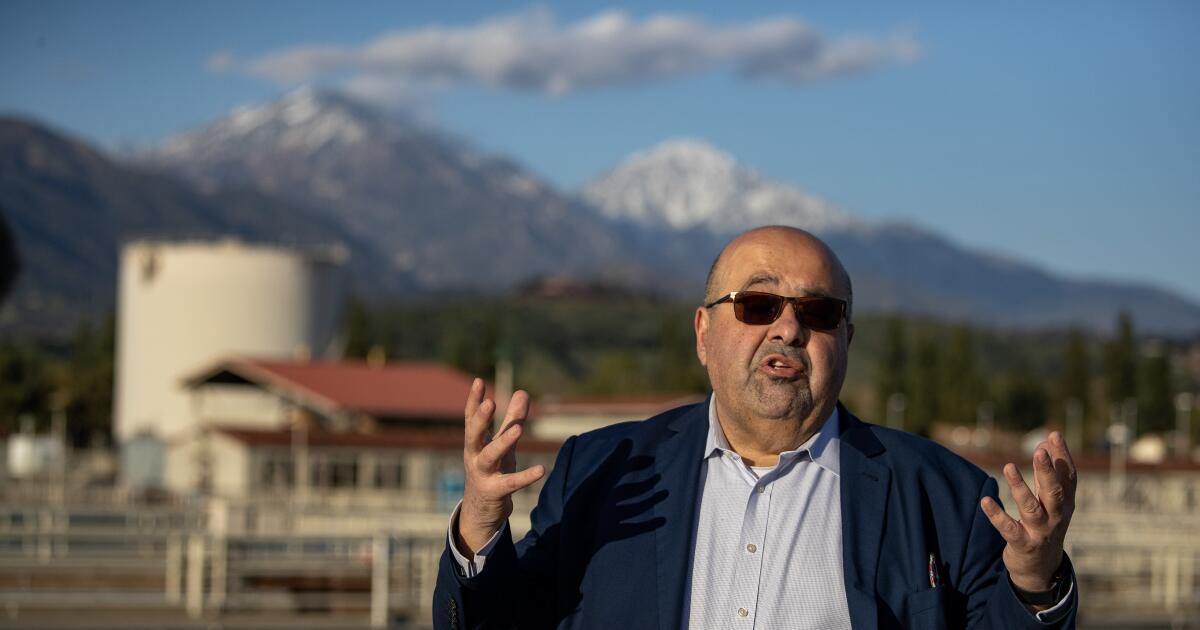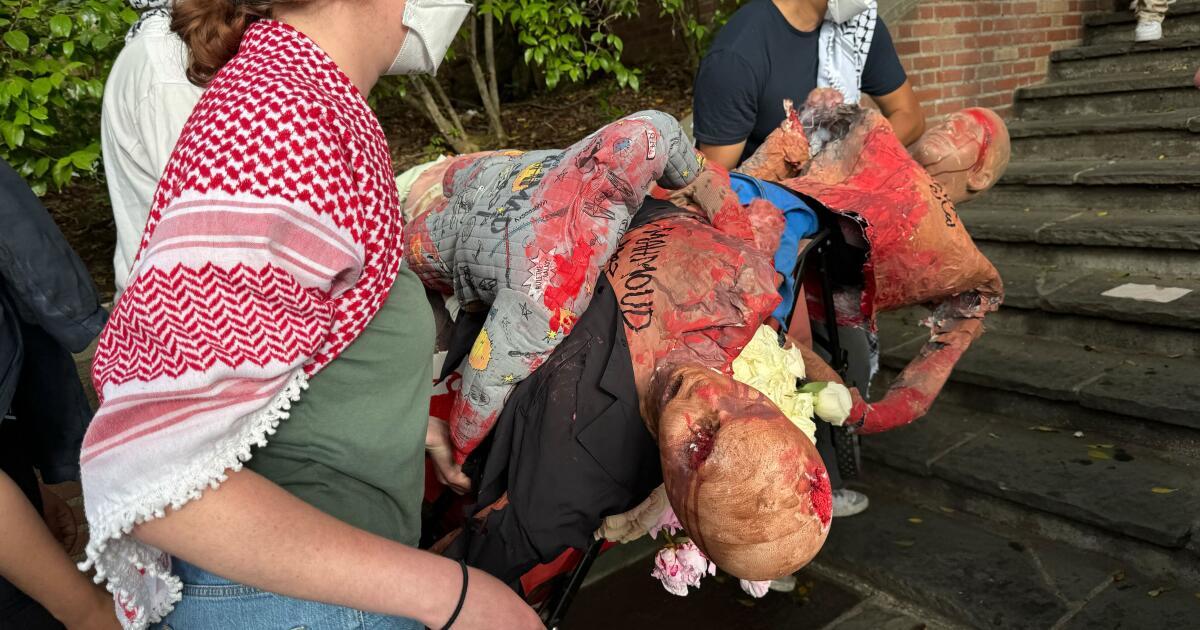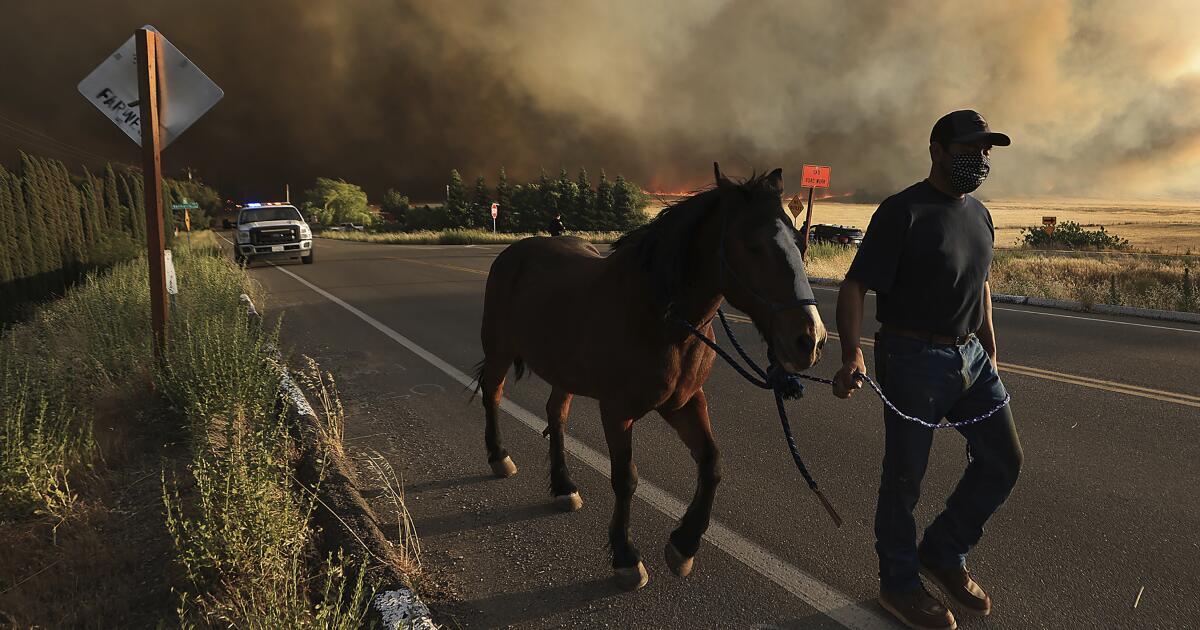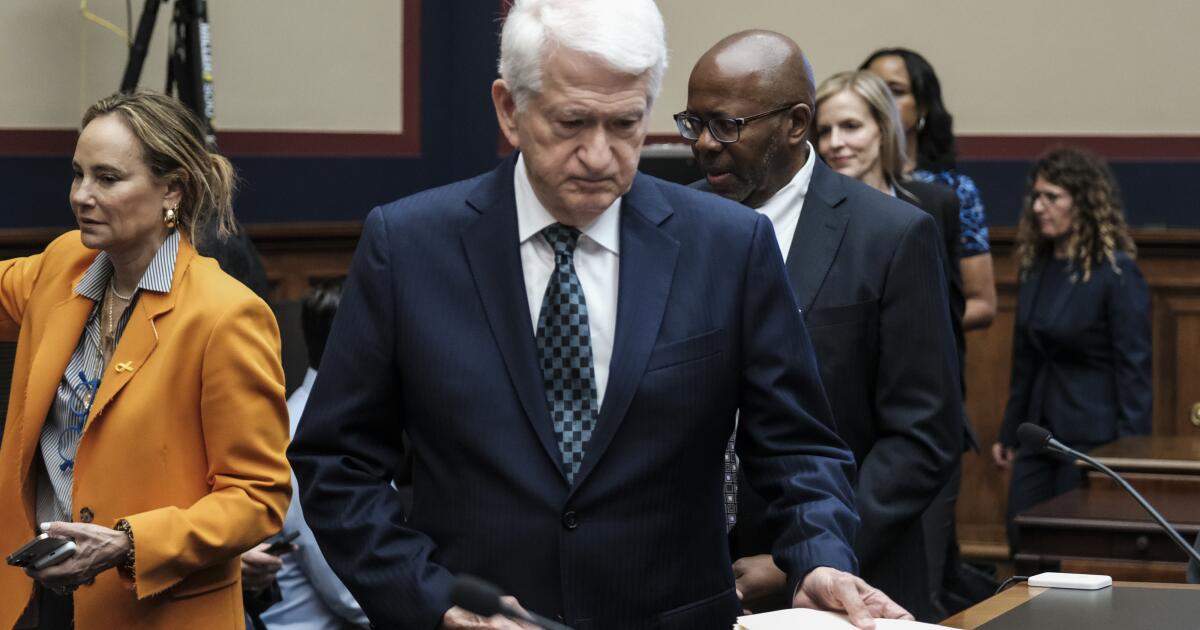World News
Sonoma State president put on leave for ‘insubordination’ for supporting Israel academic boycott, divestment
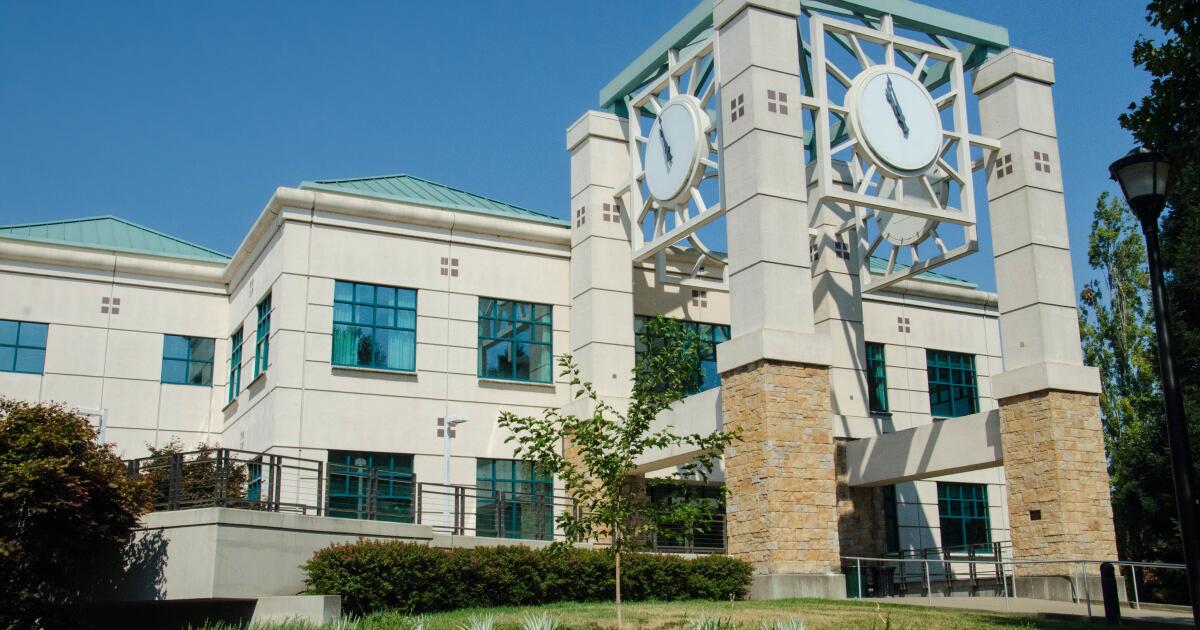

The president of Sonoma State University was placed on leave Wednesday, a day after he released a controversial campuswide message on the Israel-Hamas war that said the university would pursue “divestment strategies” and endorsed an academic boycott of Israeli universities.
California State University Chancellor Mildred García announced the decision in a statement posted to the CSU website, saying that Sonoma State President Mike Lee was taken off the job for his “insubordination” in making the statement without “appropriate approvals.”
Pro-Palestinian student encampment protesters celebrated when Lee released a letter to the roughly 6,000-student member Rohnert Park campus on Tuesday that met enough of their requests for activists to agree to dismantle their camp by Wednesday evening.
“SSU Demands Met!” said a post on the SSU Students for Justice in Palestine Instagram with the caption “brick by brick, wall by wall” that showed screenshots of Lee’s letter.
In his letter, Lee promised to pursue “divestment strategies that include seeking ethical alternatives” in consultation with pro-Palestinian activists and said he supported an academic boycott of Israel.
“SSU will not pursue or engage in any study abroad programs, faculty exchanges, or other formal collaborations that are sponsored by, or represent, the Israeli state academic and research institutions,” Lee’s Tuesday letter said.
Lee’s statement stood out. While other universities have recently said they will look into divesting from weapons companies, including UC Berkeley and UC Riverside, nearly all in the U.S. have rejected calls to target Israel specifically or to boycott formal exchange or research partnerships with Israeli universities.
In opposing such calls, the universities have cited their support of academic freedom and anti-discrimination policies. Some have also noted that a 2016 state law signed by then Gov. Jerry Brown banned giving state grants or contracts worth more than $100,000 to state universities that targeted Israel in endorsing the Boycott, Divestment and Sanctions movement.
Lee’s statement immediately drew criticism from Jewish students, parents and community groups.
Speaking at a Jewish Public Affairs Committee of California conference in Sacramento on Wednesday, California Lt. Gov. Eleni Kounalakis, who serves on the CSU Board of Trustees, slammed campuses for moving forward with agreements to quell protests.
“Each campus is handling these situations in their own way with inconsistencies and frankly, sometimes coming up with agreements that they really don’t have the authority to come up with,” said Kounalakis, who spoke before Lee was put on leave.
Kounalakis, a Democrat, said campuses were “woefully unprepared” for the recent protests.
Gov. Gavin Newsom, who made a video appearance at the same Wednesday event to promote his plan to counter antisemitism, said last week that he did “not support divestment.”
Assemblymember Jesse Gabriel (D-Encino) and Senator Scott Wiener (D-San Francisco), co-chairs of the California Legislative Jewish Caucus, commended García‘s decision, saying in a statement that Lee’s support of an academic boycott “was totally unacceptable and evidence that former President Lee is unfit to lead one of our great state institutions. We look forward to working with Chancellor García and the CSU Trustees to pursue a different path that will promote learning, respectful dialogue, mutual respect, inclusivity, and peace.”
In her letter announcing that Lee would step aside, García said she was “deeply concerned” about his words.
“Our role as educators is to support and uplift all members of the California State University. I want to acknowledge how deeply concerned I am about the impact the statement has had on the Sonoma State community, and how challenging and painful it will be for many of our students and community members to see and read,” García said. “The heart and mission of the CSU is to create an inclusive and welcoming place for everyone we serve, not to marginalize one community over another.”
In his own letter on his departure, Lee apologized, saying he had “marginalized other members of our student population” and that “I realize the harm that this has caused, and I take full ownership of it. I deeply regret the unintended consequences of my actions.”
“I want to be clear: The message was drafted and sent without the approval of, or consultation with, the Chancellor or other system leaders. The points outlined in the message were mine alone, and do not represent the views of my colleagues or the CSU,” Lee wrote.
It was unclear how long Lee will be out. He has been on the job for 20 months, about half the time as interim president.
In an interview with The Times, kinesiology professor Lauren Morimoto said she supported Lee.
“As of now, the Academic Senate has not made a statement about Mike Lee’s announcement. However, I’m meeting with the Board of the Asian Pacific Islander American Faculty and Staff Association and we stand in solidarity with Mike Lee and the student protesters…,” said Morimoto, the former chair of the academic senate. “I will ask to be added to tomorrow’s agenda to present a resolution of support for Mike Lee and the student protesters and the demands they were able to negotiate with the university.”
Staff writers Colleen Shalby and Mackenzie Mays contributed reporting.
World News
Holly Jackson: ‘Obviously, I love murder

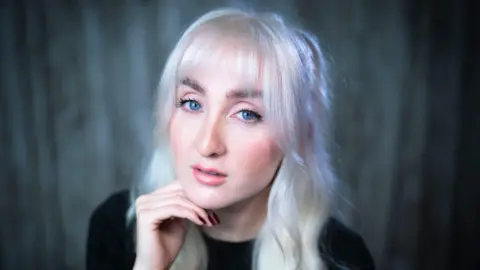 Holly Jackson
Holly JacksonBestselling author Holly Jackson shares her secrets for plotting a modern murder mystery – and explains how true crime has influenced her.
For the author of A Good Girl’s Guide to Murder, the process of writing a whodunnit is as meticulous as investigating a crime.
“I am obsessive about it,” she says. “I don’t quite have a ‘murder board’ because it’s not on the wall, but it is on the floor.”
Each scene in one of Holly’s books corresponds to an index card, which is then carefully placed into columns for each act in the story. The author admits this “does rather take over the room”.
While this is great for planning a storyline, Holly says opening her office door a “bit too ferociously” can literally blow her plot out of place.
A Good Girl’s Guide to Murder follows plucky heroine Pip Fitz-Amobi as she investigates a closed murder case. Pip soon finds a co-detective in Ravi Singh, whose brother was implicated in the crime.
Each clue, twist and turn in the story has been thoroughly discussed by Holly’s fans on TikTok; the hashtag for A Good Girl’s Guide to Murder – #agggtm – has more than 58,000 posts.
And the story has now been turned into a BBC drama by lead writer Poppy Cogan, with Holly serving as executive producer.
The Guardian called the series a “very modern Nancy Drew,” with fans on TikTok praising the show, stitching their reactions with clips from the new series.
The BBC spoke to Holly about the process of writing her hit novel. “Obviously, I love murder,” she says, “fictional murder.”
‘I need true crime in my ears’
Holly, 31, from Buckinghamshire, published her debut in 2019. She won a British Book Award the following year and has sold millions of copies around the world.
While her fiction fits into the young adult category, Holly does not shy away from heavier topics, like crime. Her first novel, for example, follows the disappearance and apparent murder of a school girl.
And Holly says true crime content – like the podcast Serial – became a “very useful” tool when writing A Good Girl’s Guide to Murder. The structure of the book feels like a podcast, Holly says, adding: “We have transcripts of dialogue the whole time.”
In the sequel to Holly’s first book – called Good Girl, Bad Blood – Pip even creates a true crime podcast herself.
And Holly says this research tool soon seeped into her real-life. “I can’t really do anything without a true crime podcast,” she says. “If I’m walking the dog or washing the dishes, I need true crime in my ears.”
Allow TikTok content?
In the last ten years, true crime series have won international acclaim: Serial won a Peabody Award in 2015 and In The Dark – a long-form investigative journalism series – became the first podcast to win a George Polk Award in 2019. And, according to The New York Times, Serial has had more 705m downloads.
Even Holly is curious why crime is such a popular source of entertainment.
“Especially with young women,” she wonders, “is that like, an instinct in us that’s trying to protect ourselves?”
Georgia Hardstark is the co-host of My Favorite Murder, a US podcast that looks into historic and modern cases, with one episode covering the Dancing Plague of 1518 and the Paper Bag Killer.
For Georgia, part of the reason she is so interested in true crime is that it helps her feel less “paranoid” and validates her anxieties about life, she explains.
“That is at the forefront of my mind, constantly, you know, ‘What’s around the next corner? Are my doors locked?'”
‘I know who the murderer is’
For Holly, the line between fact and fiction is clearly drawn: unlike true crime cases, she always knows “the ending before I even write the first sentence”.
“I knew from the get-go who the murderer was going to be, this whole setup,” she says. “The slightly more complicated thing is not working out the mystery – it’s working out how Pip is going to solve the mystery.”
In A Good Girl’s Guide to Murder, for example, Pip uses her Extended Project Qualification – an accreditation where a student independently researches a given topic – to interview suspects and keep track of clues for the case.
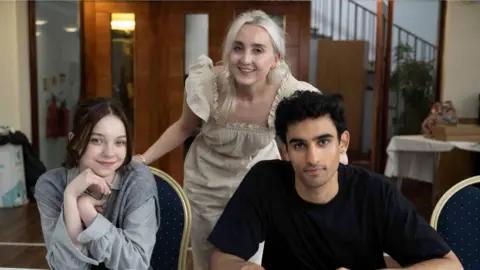 BBC/Moonage/Sally Mais
BBC/Moonage/Sally MaisWhile Holly uses true crime as a “jumping off” point for research, she notes the content, often used as a source of entertainment, is “obviously, about real life people’s trauma”.
Jessica Jarlvi – a “Scandi-noir” writer and lecturer on the University of Cambridge’s Crime and Thriller Writing course – says things like true crime podcasts risk sensationalising these events.
“It just puts me off,” she says, “whereas in fiction, you don’t have to worry about that.”
In Georgia’s view, however, ignoring real-life crime – often with women victims – “is to sweep it under the rug”.
‘I don’t have passive readers’
Modern crime readers are “becoming more and more demanding”, Jessica adds.
Holly agrees: “I don’t have those passive readers, I have the really active ones who are looking to solve the mystery.”
On TikTok, fans of A Good Girl’s Guide to Murder share videos with their predictions and suspect lists as they read along with the book.
In one video, a reader guides people on how to annotate the book to keep track, colour co-ordinating sections into “clues” and “conflicts”.
“It makes me have to up my game a bit more,” Holly says.
Wondering how to watch A Good Girl’s Guide to Murder? You can stream the series on BBC iPlayer.
World News
For sale: A piece of California’s country music history
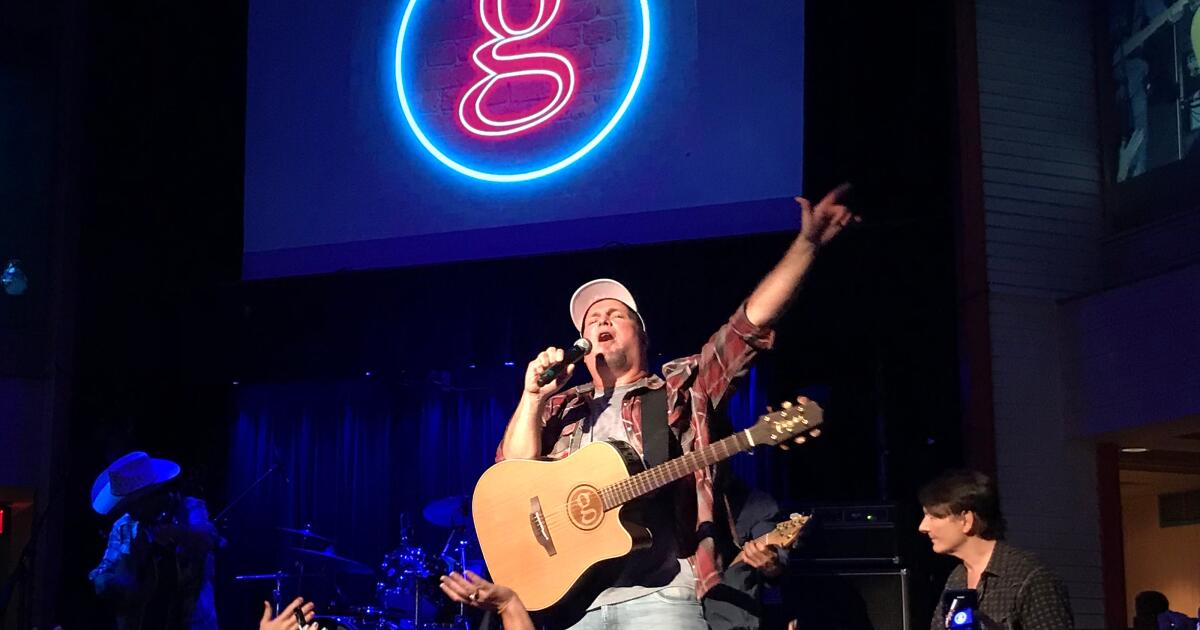

The famed Buck Owens Crystal Palace, where music legends including Willie Nelson, Dwight Yoakam, Garth Brooks and a young Taylor Swift have played, is up for sale, with the foundation that runs the Bakersfield venue planning to list it for $7 million on Monday.
The nightclub, museum and steakhouse was owned by its namesake Buck Owens, the country music trailblazer who bucked the slick commercial melodies of Nashville for a distinctly West Coast twang. Owens opened the Crystal Palace in 1996, watching it become a premier venue for the biggest names in country music, including himself. Buck and the Buckaroos played there every Friday and Saturday night until his death in 2006.
Jim Shaw, a member of the Buckaroos and a director of the Buck Owens Private Foundation, said that after 28 years of running the famed venue, the Owens family plans to step back and find new owners amid a challenging business climate. The foundation said in a statement that “since Buck’s passing in 2006, we’ve tried to maintain the excellence that he expected, even as it became more and more difficult during these challenging times of increasing food and labor costs.”
The venue is not closing and scheduled events will continue as planned, Shaw said.
“It’s business as usual for now,” Shaw said. “Ideally, someone who wants to keep it exactly as it is will come forward.”
Owens’ youngest son, Johnny Owens, wrote on Facebook that the family’s hope “is that a buyer steps forward with a vision for the future and a reverence” for his father and the Bakersfield Sound.
The Crystal Palace, located on Buck Owens Boulevard, is a major tourism staple for Bakersfield. The 18,000-square-foot venue is next to the city’s downtown entrance.
“It’s the No. 1 tourist attraction in Bakersfield,” Shaw said. “There are people stepping forward and we are waiting to see what happens. I am getting a lot of phone calls. I’m anxious to see what happens.”
World News
2nd local radio host says they were given questions ahead of Biden interview

A second local radio host on Saturday told ABC News that he was provided a list of questions in advance of his interview with President Joe Biden this week.
“Yes, I was given some questions for Biden,” Earl Ingram of CivicMedia told ABC News. Ingram, a prominent host of a Wisconsin radio station, interviewed Biden this week in the wake of his debate performance.
Ingram said he was given five questions and ended up asking four of them.
“I didn’t get a chance to ask him all the things I wanted to ask,” he said.
Ingram is the second interviewer who now says they were provided questions by Biden aides to ask the president this week. Earlier today, another local radio host who interviewed Biden this week told CNN she was given questions to ask Biden before the interview.
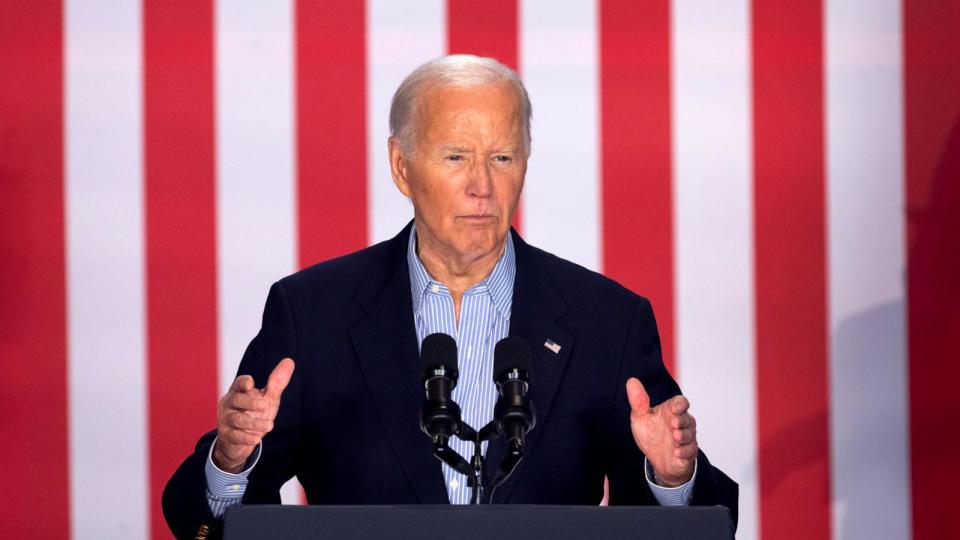

“We do not condition interviews on acceptance of these questions, and hosts are always free to ask the questions they think will best inform their listeners,” the Biden campaign told ABC News on Saturday.
Ingram told ABC he didn’t see anything necessarily wrong with the practice. “To think that I was gonna get an opportunity to ask any question to the President of the United States, I think, is a bit more than anybody should expect,” he said.
He continued that he was grateful for the opportunity to interview Biden at all.
“Certainly the fact that they gave me this opportunity … meant a lot to me,” Ingram said.
MORE: Wealthy Democratic donors sound alarm over Biden staying in race
On CNN earlier today, Andrea Lawful-Sanders, the host of WURD’s “The Source,” said Biden officials provided her with a list of eight questions ahead of their interview with Biden.
“The questions were sent to me for approval; I approved of them,” she said.
“I got several questions — eight of them,” she continued. “And the four that were chosen were the ones that I approved.”
Responding to Lawful-Sanders, Biden campaign spokesperson Lauren Hitt said in a statement that it’s not “uncommon” for interviewees to share topics they would prefer. She noted that Lawful-Sanders was “free” to ask any questions she saw fit. She also noted that it was the campaign who sent over the questions and not the White House as other reports claim.
Lawful-Sanders did note in her interview with CNN that she ultimately “approved” the questions provided.
“It’s not at all an uncommon practice for interviewees to share topics they would prefer. These questions were relevant to news of the day – the president was asked about this debate performance as well as what he’d delivered for black Americans,” the statement said.
“We do not condition interviews on acceptance of these questions, and hosts are always free to ask the questions they think will best inform their listeners. In addition to these interviews, the President also participated in a press gaggle yesterday as well as an interview with ABC. Americans have had several opportunities to see him unscripted since the debate.”
A source familiar with the Biden booking operation told ABC News that moving forward they will “refrain” from offering suggested questions to interviewers.
“While interview hosts have always been free to ask whatever questions they please, moving forward we will refrain from offering suggested questions.”
2nd local radio host says they were given questions ahead of Biden interview originally appeared on abcnews.go.com
-

 African History5 years ago
African History5 years agoA Closer Look: Afro-Mexicans 🇲🇽
-

 African History5 months ago
African History5 months agoBlack History Facts I had to Learn on My Own pt.6 📜
-

 African History5 years ago
African History5 years agoA Closer Look: Afro-Mexicans 🇲🇽
-

 African History1 year ago
African History1 year agoMajor African Tribes taken away during the Atlantic Slave Trade🌍 #slavetrade #africanamericanhistory
-

 African History1 year ago
African History1 year agoCameroon 🇨🇲 World Cup History (1962-2022) #football #realmadrid #shorts
-

 African History5 months ago
African History5 months agoBlack History Inventors: Mary Kenner 🩸
-

 African History1 year ago
African History1 year agoPROOF AFRICAN AMERICANS AIN'T FROM AFRICA DOCUMENTED EVIDENCE
-

 African History1 year ago
African History1 year agoNo African pre-Columbus DNA? 🤯🤯 #history #mesoamerica #mexico #african


